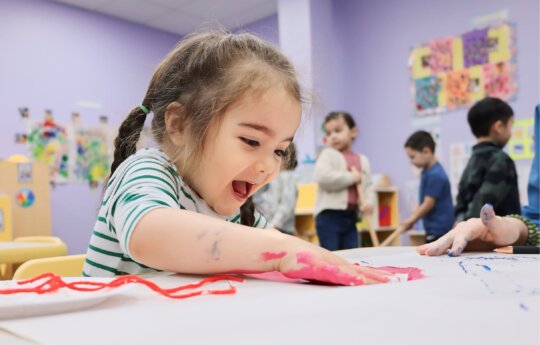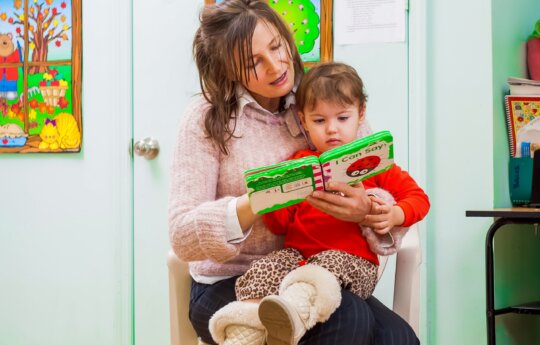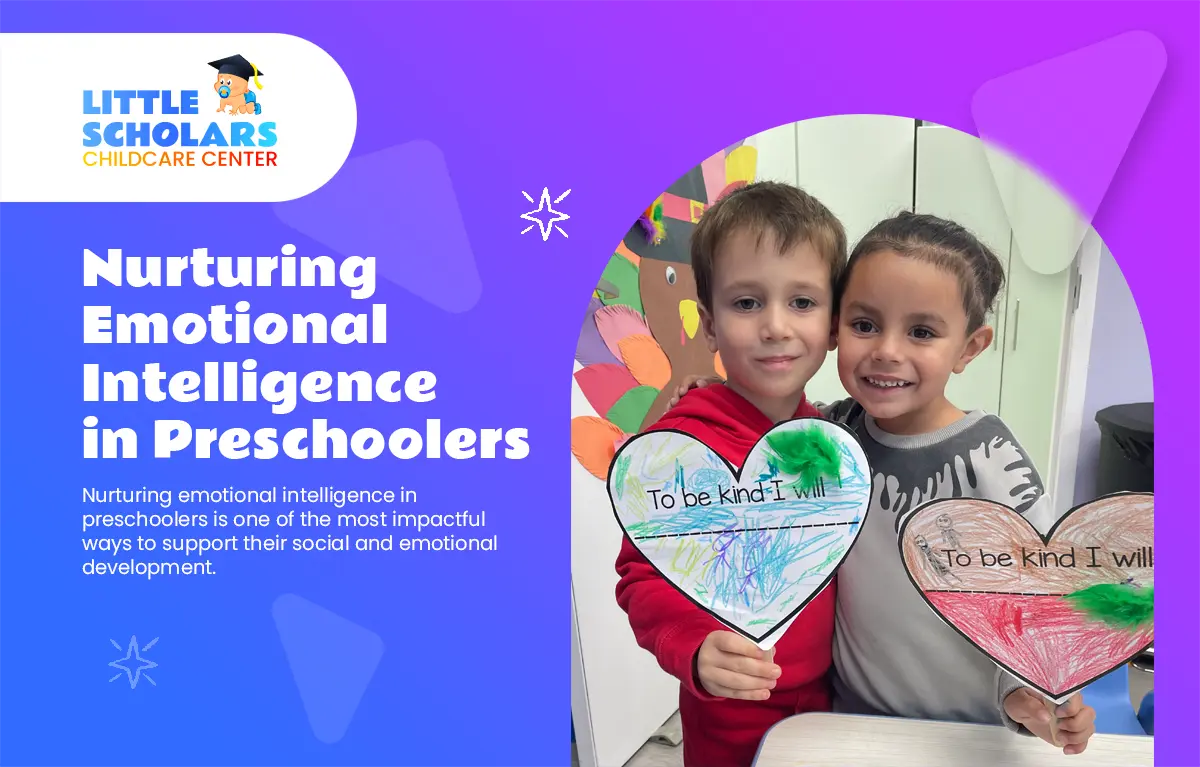
Nurturing emotional intelligence in preschoolers is one of the most impactful ways to support their social and emotional development. Emotional intelligence, or the capability to understand and manage one’s emotions, helps young children build meaningful relationships, navigate challenges, and create a strong sense of self. During preschool, children begin to recognize their emotions, empathize with others, and communicate their feelings effectively.
By fostering these skills through thoughtful guidance and interactive play, parents and educators can lay the groundwork for a lifetime of emotional resilience. We believe in creating a nurturing setting where children feel safe to explore their emotions, connect with others, and grow into confident, compassionate individuals.
The Benefits of Emotional Intelligence in Children
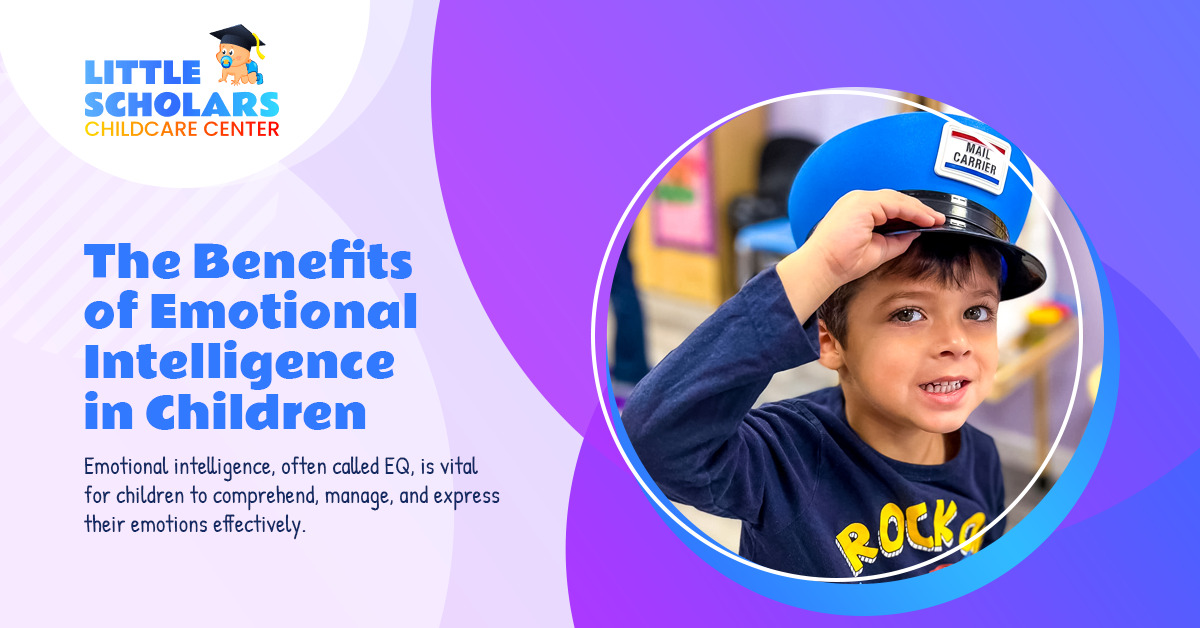
Emotional intelligence, often called EQ, is vital for children to comprehend, manage, and express their emotions effectively. Developing emotional intelligence in children during their early years profoundly impacts their overall growth, equipping them with tools to navigate social interactions, face challenges, and build lasting relationships.
Improved Communication and Emotional Expression
One key benefit of emotional intelligence in children is their ability to communicate their feelings clearly and constructively. Children can better articulate their needs and experiences when they learn to identify and express emotions, reducing frustration and misunderstandings.
Some communication-related benefits of EQ include:
- Clearer self-expression: Children can explain their feelings instead of acting out.
- Stronger listening skills: Understanding emotions helps children empathize with others.
- Conflict resolution: EQ equips children with tools to address disagreements calmly and respectfully.
These skills create a foundation for meaningful interactions, enabling children to effectively connect with peers, teachers, and family members.
Building Empathy and Strong Relationships
Emotional intelligence nurtures empathy, the ability to understand and share others’ feelings. Empathy allows children to build deeper connections, fostering strong and positive relationships.
Key relationship-building benefits of EQ include:
- Understanding diverse perspectives: Children become more aware of how others feel.
- Cooperation with peers: Emotional awareness encourages teamwork and collaboration.
- Conflict prevention: Recognizing emotions in others helps children avoid misunderstandings.
Children learn to value kindness and respect through empathy, creating bonds that support their social and emotional growth.
Better Self-Regulation and Emotional Resilience
A significant aspect of emotional intelligence is the ability to regulate emotions, which helps children navigate challenges and setbacks with a sense of calm and confidence.
Some self-regulation benefits include:
- Managing frustration: Children learn to stay composed when things are unplanned.
- Delaying gratification: EQ teaches patience and long-term thinking.
- Adapting to change: Emotionally intelligent children are better equipped to handle transitions.
By developing these skills, children gain emotional resilience, essential for overcoming obstacles and maintaining a positive outlook.
Boosting Confidence and Independence
Emotional intelligence is crucial in helping children build confidence and develop independence. By understanding and managing their emotions, children feel more in control of their actions and decisions, fostering a sense of self-assurance.
Key confidence-boosting benefits of EQ include:
- Improved decision-making: Children learn to make thoughtful choices based on feelings and values.
- Increased self-awareness: Recognizing their emotions helps children understand their strengths and areas for growth.
- Greater independence: EQ empowers children to handle challenges independently with minimal guidance.
With these skills, children become more self-reliant and prepared to tackle new experiences, building a solid foundation for lifelong confidence and success.
Teaching Emotional Intelligence to Preschoolers
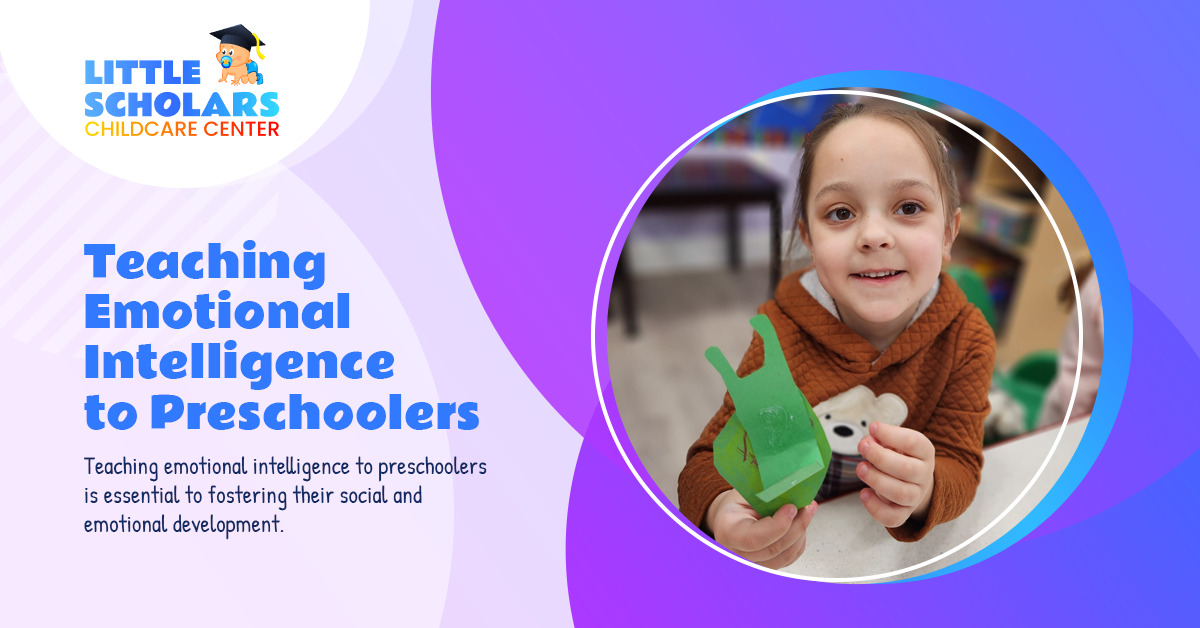
Teaching emotional intelligence to preschoolers is essential to fostering their social and emotional development. By helping young children recognize, understand, and manage their emotions, educators and parents can set the stage for better relationships, stronger communication skills, and emotional resilience. This process involves creating opportunities for children to explore their feelings and develop empathy for others in a nurturing and supportive environment.
Introducing Emotions Through Everyday Language
The initial step in teaching emotional intelligence is helping preschoolers identify and name their emotions. When children can label their feelings, they are better equipped to express and manage them.
Here’s how to incorporate emotional language into everyday life:
- Use real-life examples: Talk about emotions during daily interactions, such as saying, “I see you’re feeling frustrated because your toy isn’t working.”
- Read books about emotions: Choose stories that highlight different feelings and discuss the characters’ experiences.
- Create an emotion chart: Use visuals with faces showing various emotions to help children point out how they feel.
By normalizing emotional conversations, children learn that feelings are natural and can be expressed constructively.
Encouraging Empathy Through Role-Playing
Empathy is a core section of emotional intelligence, and role-playing is an effective way to help children understand how others feel. These activities allow preschoolers to step into someone else’s shoes and explore different perspectives.
Role-playing ideas to foster empathy:
- Pretend play scenarios: Act out common situations, like sharing toys or comforting a sad friend.
- Puppet shows: Use puppets to create stories where characters navigate emotions and relationships.
- Discussion prompts: After role-playing, ask questions like, “How do you think they felt?” or “What could you do to help?”
These activities build compassion and teach preschoolers to respond thoughtfully to others’ emotions.
Using Games to Teach Self-Regulation
Self-regulation is managing emotions and behaviors, which can be developed through engaging games and activities.
Games that promote self-regulation:
- Freeze dance: Play music and encourage children to stop moving when it stops, teaching impulse control.
- Emotion charades: Act out emotions like happiness, sadness, or anger and have children guess the feelings.
- Calm-down jars: Fill a jar with glitter and water; watching the glitter settle helps children calm themselves during stressful moments.
These activities provide a playful way to practice emotional management while keeping children engaged and entertained.
Modeling Emotional Intelligence for Preschoolers
Children learn emotional intelligence best by observing the adults around them. Preschoolers tend to imitate and adopt healthy emotional behavior when parents and educators model healthy emotional behavior.
Ways to model emotional intelligence:
- Express your emotions: Share your feelings openly, such as saying, “I’m feeling happy because you shared so nicely.”
- Show empathy: Validate children’s feelings by saying, “I understand you’re upset because it’s hard to wait.”
- Practice self-regulation: Demonstrate calm behavior in challenging situations, showing children how to handle emotions constructively.
By being a role model, you provide a consistent example of how to navigate emotions and relationships effectively.
The Role of Social-Emotional Development in Early Childhood
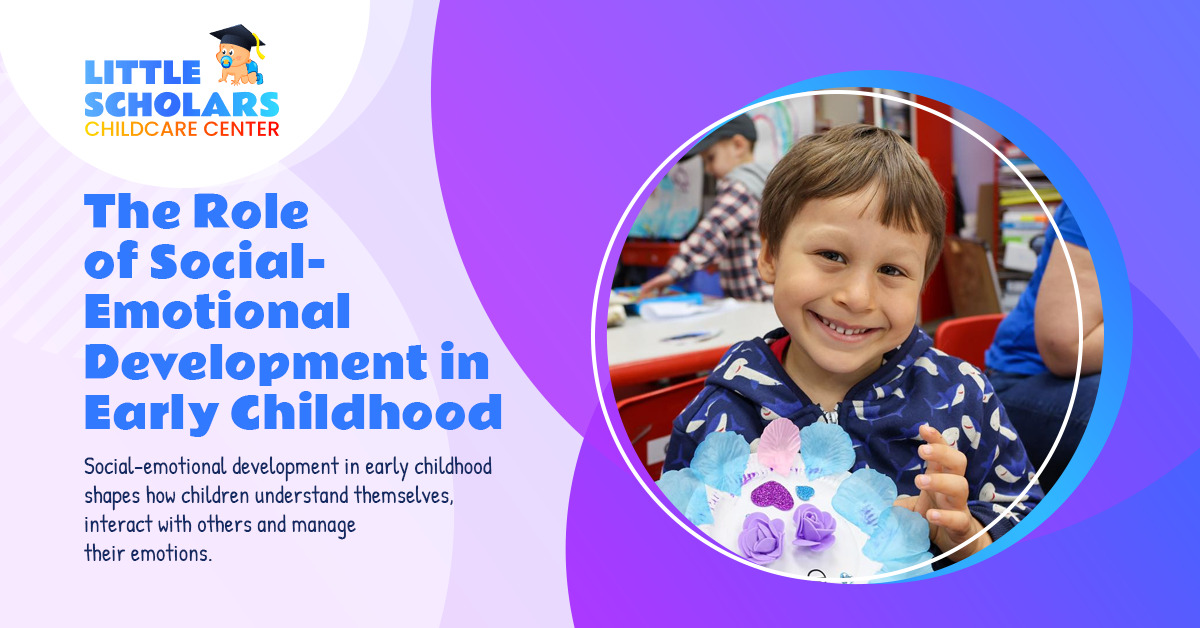
Social-emotional development in early childhood shapes how children understand themselves, interact with others and manage their emotions. This critical growth area lays the foundation for healthy relationships, effective communication, and emotional resilience. Parents and educators can help children thrive in all aspects of life by fostering social-emotional development during preschool.
Understanding Social-Emotional Development
Social-emotional development encompasses a child’s ability to form relationships, recognize and manage emotions, and navigate social environments. It is key in how children build connections and respond to challenges.
Key components of social-emotional development include:
- Self-awareness: Recognizing one’s emotions, strengths, and limitations.
- Social awareness: Understanding and empathizing with the feelings of others.
- Relationship skills: Building healthy connections through cooperation and communication.
These elements help children develop a strong sense of self and the ability to engage positively with the world around them.
Why Social-Emotional Development Matters
The impact of social-emotional development extends beyond early childhood. It influences how children perform academically, navigate friendships, and manage stress. When nurtured effectively, these skills contribute to lifelong success and well-being.
The importance of fostering social-emotional development:
- Stronger relationships: Children learn to share, cooperate, and resolve conflicts.
- Better emotional regulation: Helps children manage frustration, excitement, and sadness.
- Improved academic readiness: Emotional stability and social skills create a positive learning environment.
Investing in social-emotional growth during early childhood ensures children are well-prepared for future challenges and opportunities.
Activities to Support Social-Emotional Development
Incorporating social-emotional learning into daily routines helps children practice these skills in a supportive environment. Engaging activities encourage children to explore their emotions and build connections with others.
Examples of activities include:
- Emotion sorting games: Use cards with faces showing different emotions and ask children to identify and sort them.
- Collaborative group projects: Activities like building a tower together teach teamwork and problem-solving.
- Mindfulness exercises: Simple breathing techniques or sensory activities help children manage emotions and focus.
These activities create opportunities for children to learn and practice essential social-emotional skills in a playful and meaningful way.
The Role of Adults in Social-Emotional Development
Parents, teachers, and caregivers are pivotal in nurturing social-emotional growth. By creating a supportive environment and modeling positive behaviors, adults provide children with the tools to succeed.
Ways adults can support social-emotional development:
- Validate emotions: Acknowledge children’s feelings by saying, “I understand you’re feeling upset, and that’s okay.”
- Encourage problem-solving: Guide children to think through conflicts and find solutions.
- Model empathy and kindness: Show compassion in interactions to teach children how to treat others.
By actively participating in their social-emotional growth, adults help children build a strong foundation for confidence, empathy, and resilience.
Conclusion
Social-emotional development is the cornerstone of a child’s early growth, equipping them with the skills to navigate relationships, express emotions, and confidently handle life’s challenges. We set the stage for a lifetime of success and well-being by fostering emotional intelligence and creating opportunities for meaningful connections. Children develop the empathy, resilience, and self-awareness they need to thrive with the proper guidance and nurturing environment.
At Little Scholars NYC, we support every child’s social-emotional journey through engaging activities, expert guidance, and a loving atmosphere. Ready to see how we can help your child grow emotionally and socially? Book a tour today to explore our programs and discover the Little Scholars difference. Visit this page or call us at +1 917-475-0001 to get started!


